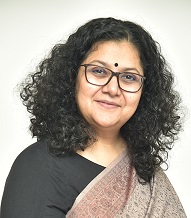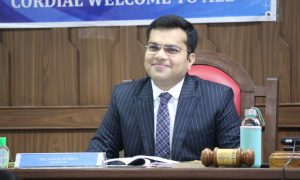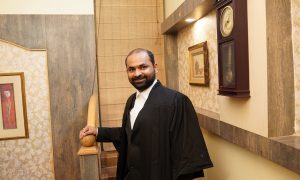This interview has been published by Prabhjot Singh, Priyanka Karwa and The SuperLawyer Team

Did you always want to become a Lawyer or was it something that you decided in the later part of your school life? What other career options would you have considered, if not law?
While in school, there were a lot of things that I was interested in – Biology, Computers, Design (not Fashion), etc and I was exploring careers in those areas. Law was not really on the radar even though my paternal grandfather was a practicing lawyer and his father, grandfather and several of his siblings were lawyers. I had written the entrance exam to National Institute of Design since I had a thing for magazine covers and even had an admission in Microbiology after my twelfth standard.
Law came into the picture courtesy a friend who was going to write the entrance exam for NLSIU and I tagged along with him. When I made it through, my mum was unsure and she spoke to my god-father who convinced her that NLSIU was a good school and that I should take it up. The rest is history.
How do different approaches of adjudicators help in critical thinking? Do you believe that it helps in understanding cross-cultural overlaps in legal systems?
The profession of law, is all about interpretation of the law to a given set of facts, irrespective of which area of law you are practicing. The context, nature and circumstances may change, but a lawyer will always need to be able see what law “fits in”. In my view, “critical thinking” as a word is an abstract term and the interpretation of that itself can spark a debate.
There is a co-relation between law, logic and reasoning. I also believe that each of us have inherent problem solving skills. It is these skills that we need to focus on and hone. If we get lost in the complexity of legal issues, we will forget the most fundamental of them all.
While it is important to observe and learn from different approaches used by different from of adjudicators, it is equally important to understand which of these approaches work for you and then adapt accordingly. At the end of the day, you need to be your own person.
When it comes to understanding cross-cultural over-laps in legal systems, while it may give you a well-rounded understanding of the world-view of legal jurisprudence and shape you as a lawyer and a person, the choice of whether it is a necessity or not, will eventually boil down to whether it is something that you need in your chosen practice area.
Do you believe that being related to a family of lawyers helps in this profession?
I am a believer of hard work, smart work and merit. While having lawyers in the family, may provide an initial push, your growth is where you take it. If you look at the who’s who of the legal fraternity today, you will find a significant number of professionals in that list who do not come from a family of lawyers/have close relatives who are lawyers.
Being specialised in technology law matters, how do you think this area will evolve in the future?
My areas of specialisation are not limited to technology laws. I also do a significant amount of work in the area of life-sciences and healthcare and real estate. Additionally, I am a trained mediator.
Technology has infiltrated almost every area of business and consequentially every area of law – it has become a suffix used with other areas of specialization – and we will see more of that. For example, fintech, medtech, healthtech, biotech, edtech, etc.
Technology has always pushed the boundaries of traditional legal concepts/understanding and even technologies in the early 1990’s drove conversations around “jurisdiction” and “person” – issues that we are still grappling with. Technologies such as blockchain have triggered discussions when it comes to smart contracts and crypto-currency.
Technology will also impact the way we do our work as lawyers, as some mundane and routine tasks will be digitised or be undertaken by using artificial intelligence. We are seeing that even today. When I started working, we went to the office of the registrar of companies do undertake a manual search for the purpose of a legal due diligence, then came online search of the documents on the website of the Ministry of Corporate Affairs – today we have AI tools that give you the entire search report and that too customised for what you are looking. You also have automatic document generators that can prepare first cut drafts of agreements. Technology is also assisting in dispute resolution.
There is innovation happening at a faster pace than ever and we see emerging technologies being announced almost every day. Some of these emerging technologies will disrupt our lives and the way we think and work. We may see the need to amend existing laws, pass newer legislations, think of interpretation of law differently because of these emerging technologies. We also need to really evaluate as to the real value that we bring on the table as lawyers, which is something that technology cannot replace or replicate.
AI and the role of legal technology in our profession is literally booming, do you think it will create further opportunities for young law professionals ahead?
As mentioned earlier, AI and technology have already made inroads into the legal profession. While there are tools that assist us, they have also made certain mundane tasks that were done by people almost obsolete. The use of AI and technology in law will increase. However, it is important to differentiate the use of such AI or technology as a tool for lawyers (such as case management software, case search engines, etc) or to reduce the reliance of parties on lawyers (such as document generators) is something that legal professionals need to understand.
A legal professional needs to be able to use AI and technology as a tool and also be able to understand and adapt to future tools. On the other hand, legal professionals need to be aware of the impact that future technologies will have on the profession of law and constantly upskill themselves for any possible disruption.
Having said that, whenever we see disruptive new technologies, there are legal issues that go hand in hand and in some instances, we see newer business/industry verticals arising as well as newer learning. As mentioned earlier, we may see the need to amend existing laws, pass newer legislation’s, think of interpretation of law differently because of these emerging technologies.
Newer opportunities will arise and young professionals need to keep up with the emerging developments in AI and technology to identify them.
Please tell us a few challenges that being a mediator one has to be prepared for facing?
Mediation is an emerging field in India. While it has been in the law books for over two decades, in some form or another, it has been in the spotlight only in the last couple of years.
The law makers, courts, lawyers and most of all, the litigants or parties in conflict are still not aware as to what is mediation, the role of a mediator and how mediation can be used as an effective dispute resolution tool.
Lawyers in mediation need not be only mediators. Lawyers also represent parties in mediation and they play a significant role in the mediation process. The focus so far seems to be on the mediators. However, the challenge really is having good counsel to the parties in mediation.
Counsel to disputing parties play an important part in a mediation since they are the ones who understand the dispute from a legal perspective and are also who the parties usually trust at the first instance. The counsel also plays an important role in preparing the parties for mediation. Unfortunately, because of a lack of awareness, this preparation for mediation is seldom there and this can derail the mediation process or result in delays. Additionally, most conversations on mediation happen from either from the perspective of the mediator or on the process, but there is little conversation that happens on the role of the counsel.
Infact, young lawyers who feel passionate about mediation, should really look at the skills required for them to be able to support and engage their clients effectively in mediation.
Ekta, what has been your motivation for reaching thus far in life? I mean, how do you make yourself well equipped for every challenge?
I would love to say that the challenges that every new matter brings is the motivation for me. However, that is only a small part of what motivates me. I am a very people person, so my partners, my team and clients keep me motivated to continue. I learn and reflect from my interactions with them. And for that, I am forever thankful and grateful. Adding to that bundle is the constant learning – it keeps me on my toes and keeps monotony at bay. I am forever reading and learning as the law keeps changing and this also keeps me motivated.
I do not believe that we are always equipped for every challenge. If we were, the challenge would cease to be that – a challenge. Rather, I am always open to deal with and handle any challenge, and for that I broadly follow the following steps
(i) keeping an open mind – my existing thought process/opinions should not cloud my judgment;
(ii) taking a pause and reflecting on the challenge to understand it – so that I do not hurry into it without a full understanding of what I am dealing with;
(iii) break down the challenge into smaller pieces – this gets me to understand the real issue or challenge;
(iv) deal with the pieces that I am familiar with – comfort of being in a familiar territory;
(v) consult with others and discuss issues that I do not understand – I am not always right and another view gives me additional perspective;
(vi) look the final outcome holistically after putting together the pieces and see if I am satisfied with the outcome as a whole – pieces may make sense individually, but they also need to work as a whole.
Lastly, any few suggestions for our young law professionals?
Find yourself and be yourself – as a person and a professional. Develop your own working style, including your own language. While you may learn and be influenced by best practices, being a copycat of someone else’s personality or working style may seem good in the first, but in the longer run it catches up with you and you may not be able to keep up.
– EKTA BAHL
Get in touch with Ekta Bahl-























